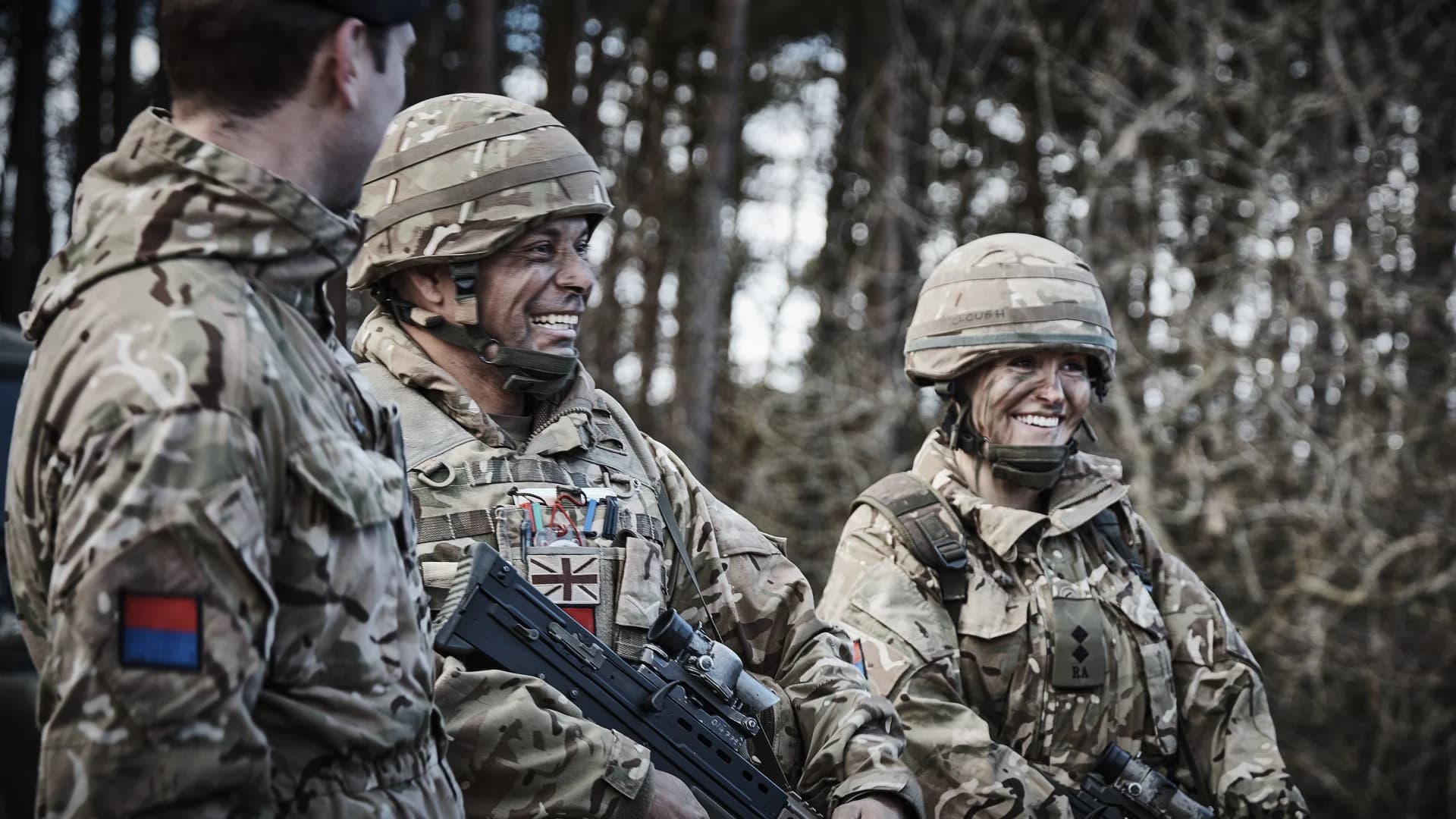
Is it common to leave the army after your 3 years as a GDMO?

Additional information
Do people ever join the army as a doctor, complete their years as a GMDO and then leave the army and continue as normal within the NHS; essentially, is it possible to have the experience and build the skills as an army doctor, but then pursue a traditional NHS career, but just 3 years behind your colleagues? Just asking as I’m not sure if when making the decision to join the army as a doctor, you should be prepared to to commit most of your career to this, or if you can do it for the experience/skills/something new, but then leave if you find it isn’t for you in the long-term?
Anonymous asked a question to Tori C.
Category: General
Date asked: Thursday, April 8, 2021
Last reviewed: Friday, April 9, 2021

Tori C.
Regimental Medical Officer
Hello,
Yes absolutely. Lots of people join with that mindset, it's a big ask to commit to a military career, and I certainly joined with the view to doing 3 years and then reassessing, as did many of my colleagues. The vast majority do decide to stay in the military, but a handful will leave after GDMO and return to the NHS, or occasionally pursue different career pathways altogether.
Thursday, April 8, 2021
Anonymous
Thanks! I’m starting medical school in September and have been looking at joining the army as a doctor but am not 100% sure yet. I like the idea of the once in a lifetime opportunity and life experiences of being in the army. However, I don’t particularly know if these are valid reasons or if it will just unnecessarily set me back 3 years in training should I leave after GDMO. What would you recommend I do to see if it’s for me or not? There doesn’t seem to be a whole load of resources (other than your Q&As!) but maybe university/army career centres will help with this? My school never offered anything like Cadets, and don’t know if there are similar things at university (and/or if I’d have time as a medical student). If you wouldn’t mind sharing how you personally came to the decision; who you spoke to / extra curriculars you did etc. Thanks again!
Thursday, April 8, 2021

Tori C.
Regimental Medical Officer
Life experiences seems like a pretty valid reason for joining to me! It's better than my reason, which was simply that I didn't know what else to do and one of my friends had recently joined and said it was fun...
I agree there aren't many resources out there, which I found frustrating when I was thinking of joining, hence I volunteer to do these Q&As now. So if there is anything you want to know, please do ask away.
I actually found the joining process gave me a good idea of what I was signing up for, AOSB gives you a little insight into what the Army involves, and you meet the people you will train with. You usually also get to do a familiarisation visit at RMAS and meet a few more people and hear about what the RAMC involves. It was going through that that really made the decision for me, it took such a long time, that by the time I was offered a job, I really wanted it!
Most universities will have an OTC (officer training corps) which you could try, but I wouldn't prioritise that over your studies, so don't worry if you don't have time for it. I hadn't thought about joining when I was at university so didn't do OTC, but I did play a lot of university hockey, and I think having commitment to team sports on my application was probably advantageous.
Friday, April 9, 2021
Anonymous
To be honest there’s a load of things I’d like to know but won’t bombard you all at once!!
If I’m not mistaken, you can either apply in your 2nd year of med school as a bursar, or during FY1. Of course there are pros and cons to both, but I just had some questions about the specifics. If applying as a bursar, when would you have your AOSB and Main Board roughly? I understand there can be some time between the Briefing and Main Board depending on your performance, but how would this work while still at medical school in terms of clashing with learning? Also, if you are granted the bursary, do you know if this would prevent you intercalating or would you just not receive the funding in this year?
And the same for if you apply in FY1 - whats the timescale then given that your Junior Doctor rota would already be full on? Are you given time off/take leave and did you find it hard to prepare given the hours you were working?
Thanks :)
Friday, April 9, 2021

Tori C.
Regimental Medical Officer
I am not too sure on the specifics of the bursary, I expect you would be allowed to intercalate as it's compulsory for some medical schools, but it would still be a maximum of 3 years funding. If you plan to do that I would say when you apply so they put you down as a 6 year course instead of 5 years. Apologies if I'm wrong!
In regards to time away from studies to do AOSB, often they offer you a choice of potential dates and you pick what works for you. I expect your medical school will prefer you to try and do it during the holidays. If it does clash, I wouldn't worry, medical schools are usually quite helpful and most of your work at that stage is likely to be lecture based and easy to catch up on.
Sometimes you need to leave a set period between briefing and main board, in my experience there is some wiggle room there if you have a very good reason.
Applying during foundation training is not easy, I used a huge amount of annual leave and had to swap a lot of shifts to get to all my interviews. It was also pretty tiring doing all the prep for it around work. But it is doable. Some foundation schools will let you use some study leave for the interviews (as you can use study leave for specialty training interviews), but my foundation school saw it as a 'change of career' so wouldn't grant study leave. It seemed fairly 50/50 amongst my colleagues as to who used annual leave and who used study leave.
Friday, April 9, 2021
Anonymous
Oh I see - so did you use annual leave just for the AOSB, Main Board and interviews, or also for preparation time? Also am I right in saying that if you apply in FY1 it doesn’t limit where you do your foundation years (e.g. could they be done in London even thought it isn’t in the defence unit?) Is this the same for your rotations if you apply in FY1, or would you make sure you picked specific ones such as GP and EM if you were thinking of applying to the army?
Sorry for all the questions but you’ve been by far the most useful resource!
Friday, April 9, 2021

Tori C.
Regimental Medical Officer
I used annual leave or swapped shifts to go to:
Briefing board
AOSB
Medical
Familiarisation visit
Interview
Pre Sandhurst visit
I didn't take any leave to prep, I just did that in my spare time. It's best to do little and often anyway, as most of your prep will either be getting fit or reading the news.
If you apply as a direct entrant (applying during F1) then the Army have no say in what you do before you start the commissioning course after you finish F2, so which rotations you do and where you do them is up to you! I did GP and EM, but I selected them long before I thought of joining the Army. You don't have to have done them, but it is useful.
Ask as many questions as you like!
Friday, April 9, 2021
Anonymous
Oh that makes sense - thanks! What was the rough timeline for you from applying in FY1 and then being offered the job?
I read in another discussion you said that âMost foundation trainees live in military accommodation and will attend military functions (like the Christmas ball). If you have time you could also get involved with military sports.â Is this for bursars in defence unit hospitals or direct entrants too? Just not sure how it would work for direct entrants as they would already have accommodation and be in different foundations schools.
I guess for me now the biggest thing is deciding if I actually want to apply/join and if I’d do it in med school or FY1....
Would you say you were certain you wanted to join when you applied or were just curious to see what it’d be like? For me (and I think the majority of medical students) I was certain I wanted to do medicine by year 12 and so naturally applied to medical school, but I’m not sure if it will be a similar feeling of certainty when applying to be an army doctor as it’s not a common route or the easiest to find out what it’s like, if that make sense. As you said, the recrutement process may help with this.
In general do you know how competitive/difficult it is to actually pass the AOSB and interviews? Did you know anyone who applied and was unsuccessful or know how many doctors roughly apply each year and how many get an offer?
That should be all of my questions out of the way for now! You’ve been so helpful and will definitely help me make up my mind eventually....
Friday, April 9, 2021

Tori C.
Regimental Medical Officer
I dug out my calendar and it went something like this;
Applied in July
Local recruiting office interview in September.
Medical assessment December.
Briefing board in January.
Familiarisation visit in March.
AOSB in May.
AMS interview in June.
RMAS pre course briefing in July.
Start date in October.
I got my briefing board results on the day before I left Westbury. Main board results were emailed to me the same day. Final job offer came the same day as the interview.
Military accom/functions/sports is only for bursars, direct entrants aren't employed by the military until they start the commissioning course after FY2.
I wasn't really certain I wanted to join until I got the job offer. The application doesn't tie you in to anything, so I would recommend applying and then you can always change your mind later.
It is becoming increasingly competitive to get in and unfortunately there are many doctors who won't be successful. The vast majority get through AOSB, and then the final interview is what really decides who gets in.
I would strongly recommend applying for the bursary if you can, the pros outweigh the cons (in my opinion), and if you don't get it, you at least have a second shot at getting in!
Friday, April 9, 2021
This discussion is closed, so no new comments can be added.